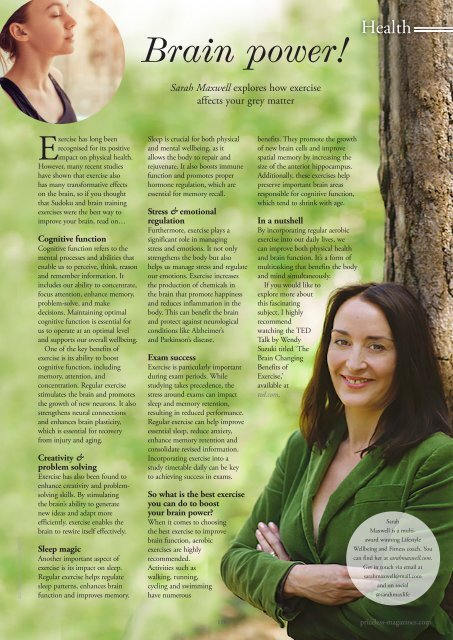Wealden Times | WT263 | April 2024 | Garden Supplement inside
The lifestyle magazine for Kent & Sussex - Inspirational Interiors, Fabulous Fashion, Delicious Dishes
The lifestyle magazine for Kent & Sussex - Inspirational Interiors, Fabulous Fashion, Delicious Dishes
Create successful ePaper yourself
Turn your PDF publications into a flip-book with our unique Google optimized e-Paper software.
Brain power! Health<br />
Sarah Maxwell explores how exercise<br />
affects your grey matter<br />
istockphoto.com/max-kegfire<br />
Exercise has long been<br />
recognised for its positive<br />
impact on physical health.<br />
However, many recent studies<br />
have shown that exercise also<br />
has many transformative effects<br />
on the brain, so if you thought<br />
that Sudoku and brain training<br />
exercises were the best way to<br />
improve your brain, read on…<br />
Cognitive function<br />
Cognitive function refers to the<br />
mental processes and abilities that<br />
enable us to perceive, think, reason<br />
and remember information. It<br />
includes our ability to concentrate,<br />
focus attention, enhance memory,<br />
problem-solve, and make<br />
decisions. Maintaining optimal<br />
cognitive function is essential for<br />
us to operate at an optimal level<br />
and supports our overall wellbeing.<br />
One of the key benefits of<br />
exercise is its ability to boost<br />
cognitive function, including<br />
memory, attention, and<br />
concentration. Regular exercise<br />
stimulates the brain and promotes<br />
the growth of new neurons. It also<br />
strengthens neural connections<br />
and enhances brain plasticity,<br />
which is essential for recovery<br />
from injury and aging.<br />
Creativity &<br />
problem solving<br />
Exercise has also been found to<br />
enhance creativity and problemsolving<br />
skills. By stimulating<br />
the brain’s ability to generate<br />
new ideas and adapt more<br />
efficiently, exercise enables the<br />
brain to rewire itself effectively.<br />
Sleep magic<br />
Another important aspect of<br />
exercise is its impact on sleep.<br />
Regular exercise helps regulate<br />
sleep patterns, enhances brain<br />
function and improves memory.<br />
Sleep is crucial for both physical<br />
and mental wellbeing, as it<br />
allows the body to repair and<br />
rejuvenate. It also boosts immune<br />
function and promotes proper<br />
hormone regulation, which are<br />
essential for memory recall.<br />
Stress & emotional<br />
regulation<br />
Furthermore, exercise plays a<br />
significant role in managing<br />
stress and emotions. It not only<br />
strengthens the body but also<br />
helps us manage stress and regulate<br />
our emotions. Exercise increases<br />
the production of chemicals in<br />
the brain that promote happiness<br />
and reduces inflammation in the<br />
body. This can benefit the brain<br />
and protect against neurological<br />
conditions like Alzheimer’s<br />
and Parkinson’s disease.<br />
Exam success<br />
Exercise is particularly important<br />
during exam periods. While<br />
studying takes precedence, the<br />
stress around exams can impact<br />
sleep and memory retention,<br />
resulting in reduced performance.<br />
Regular exercise can help improve<br />
essential sleep, reduce anxiety,<br />
enhance memory retention and<br />
consolidate revised information.<br />
Incorporating exercise into a<br />
study timetable daily can be key<br />
to achieving success in exams.<br />
So what is the best exercise<br />
you can do to boost<br />
your brain power?<br />
When it comes to choosing<br />
the best exercise to improve<br />
brain function, aerobic<br />
exercises are highly<br />
recommended.<br />
Activities such as<br />
walking, running,<br />
cycling and swimming<br />
have numerous<br />
benefits. They promote the growth<br />
of new brain cells and improve<br />
spatial memory by increasing the<br />
size of the anterior hippocampus.<br />
Additionally, these exercises help<br />
preserve important brain areas<br />
responsible for cognitive function,<br />
which tend to shrink with age.<br />
In a nutshell<br />
By incorporating regular aerobic<br />
exercise into out daily lives, we<br />
can improve both physical health<br />
and brain function. It’s a form of<br />
multitasking that benefits the body<br />
and mind simultaneously.<br />
If you would like to<br />
explore more about<br />
this fascinating<br />
subject, I highly<br />
recommend<br />
watching the TED<br />
Talk by Wendy<br />
Suzuki titled ‘The<br />
Brain Changing<br />
Benefits of<br />
Exercise,’<br />
available at<br />
ted.com.<br />
Sarah<br />
Maxwell is a multiaward<br />
winning Lifestyle<br />
Wellbeing and Fitness coach. You<br />
can find her at sarahmaxwell.com.<br />
Get in touch via email at<br />
sarahmaxwell@mail.com<br />
and on social<br />
@sarahmaxlife<br />
119<br />
priceless-magazines.com

















